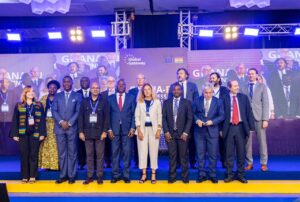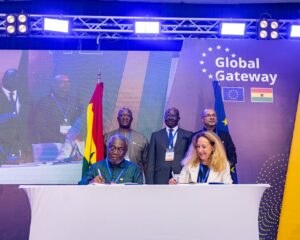By Mohammed AWAL ([email protected])
Ghana’s trade with the European Union saw a decline in value last year, with total trade amounting to €6billion.
This represents a 3 per cent decrease compared to the previous year, according to Minister of Trade and Industry Kobina Tahir Hammond.
Speaking at the 2nd Ghana-EU Business Forum themed ‘Fostering investment in non-traditional value chains under the EU Global Gateway Strategy, Mr Hammond reported a promising eight per cent increase in exports from Ghana to the EU in 2023, rising from €2.4billion to €2.6billion.
In contrast, imports from the EU to Ghana experienced an 11 per cent decline, dropping from €3.7billion to €3.3billion.
“The trade flows between Ghana and the EU are characterised by Ghana exporting primarily raw and semi-processed goods while importing machinery, vehicles and chemicals,” he stated.
The EU is one of the country’s largest investors, with investments spanning various sectors. EU investments are diverse, covering critical sectors such as agriculture, energy, manufacturing, infrastructure, telecommunications, financial services and pharmaceuticals.
“These investments not only support Ghana’s industrial transformation agenda, but also contribute in many ways to economic growth and sustainable development,” the minister said.

Sustainable long-term connection
He called for more EU investments into the Ghanaian economy which would prioritise “sustainable long-term connections” with local suppliers. This would offer greater opportunity to fully integrate social and environmental standards into the local economy.
“For inclusive growth and employment creation, EU investments and indeed foreign investments in Ghana integrate further into the economy by developing or expanding their local supply chains.
“Developing a reliable and sustainable supply chain can be challenging, but once established it can also be rewarding – not just for the investor but also actors in the local economy and within communities,” he stated.
The country’s partnership with the EU, he said, goes beyond economic and development cooperation; noting that “it is rooted in a shared vision for a safer and sustainable planet, charaterised by peace, freedom, stability and prosperity for all”.
The EU Ambassador to Ghana, Irchad Razaaly, said the forum will provide avenues of dialogue over boosting trade and investment ties between the two partner – Ghana and the EU.
“Over the next two days, we will engage in meaningful discussions, share insights and explore innovative ways of collaborating to meet these ends. We will delve into sectors like pharmaceutical and health, agribusiness, renewable energy, textiles, automotive and digital services, and explore how we can work together to create a brighter economic future,” he stated.
Massive boost for vaccine autonomy agenda
Meanwhile, Ghana has signed a new financing agreement worth €32million with the European Union to strengthen local vaccine manufacturing capacity. The symbolic signing ceremony took place at the forum between representatives from government and the EU.
This agreement is part of the EU’s Global Gateway initiative to support vaccine production in African countries. It aims to enhance Ghana’s regulatory systems, technical skills, research capabilities and private sector partnerships to develop vaccines locally.

and Myriam Ferran, Deputy Director General, Directorate General of the European Commission
The EU’s support for local vaccine manufacturing through MAV+ is in addition to the planned joint programming for 2021-2027. This demonstrates the EU’s ability to adapt to rapidly emerging needs and trends, and its strong commitment to support and respond to government’s high political priorities.
Deputy Director-General, Directorate General of the European Commission, Madam Myriam Ferran said: “ The European Union is committed to supporting Ghana’s development goals, and this investment in vaccine manufacturing and pharma is a testament to our partnership; this programme will not only enhance Ghana’s healthcare sector but also contribute to growth of the country’s economy”.
For his part, Presidential Advisor on Health, Dr. Anthony Nsiah-Asare said: “We have been working with the EU from the beginning of President Akufo-Addo’s vision to make Ghana a regional vaccine manufacturing hub. A say a big ‘thank you’ to the EU for this incredibly close collaboration”.
Since 2022, the EU has been started delivering on its promises – giving support to vaccine manufacturing at both the private and public levels in Ghana. Together with the German Development Cooperation, the EU launched a €3.1million project aimed at enhancing the capacity of Ghana’s Food and Drugs Authority.
This forms a crucial initiative to ensure that vaccines made in the country fulfil quality standards to gain access into regional and global markets.
Furthermre, in 2023 – through the European Investment Bank – the EU provided a €5million grant to DEK Vaccines Ltd., providing seed financing to support the construction of a fill-and-finish vaccine manufacturing facility located at Medie in the Greater Accra Region.










